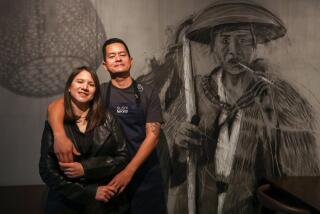For Japanese in Peru, Anniversary of WWII Has Bitter Memories
- Share via
LIMA, Peru — Antonio Simaguko was a tiny child when his father’s hog farm north of Lima was confiscated during World War II.
Simaguko, the son of Japanese immigrants, remembers it well.
“They took it away and gave it to a Chinese man. That was the last we saw of our hogs,” said Simaguko, now a taxi driver in the Peruvian capital.
Simaguko is among the thousands of Peruvians of Japanese descent who have their own unhappy anniversary to lament as the world marks 50 years since the start of the war.
In wartime persecution rare in Latin America, the pro-U.S. Peruvian government deported en masse people of Japanese descent, confiscated their property and turned a blind eye to plundering of their businesses.
Nearly Forgotten
Local researchers are only beginning to uncover this nearly forgotten chapter of Peru’s history, less well known than the similar treatment that people of Japanese descent received in the United States.
“It’s a history unknown to most Peruvians. People in the government, and even the Japanese themselves, prefer not to talk about it,” said Amelia Morimoto, an anthropologist who recently finished an oral history of the period.
The first Japanese immigrants arrived in Peru in 1899. Most were farm workers contracted for the coastal cotton and sugar plantations.
By World War II, immigrants and their children had become a prosperous community of about 15,000 concentrated around Lima.
When war began brewing in the Pacific in the 1930s, Peru’s yellow press took a cue from its U.S. counterpart and accused immigrants of taking jobs from native Peruvians, spying for Tokyo and secretly sympathizing with the Axis.
Broad Accusation
One newspaper went so far as to accuse Peru’s entire Japanese community of being a disguised army, sent by Tokyo to establish an Axis beachhead in South America.
Hostility boiled over in 1940 when bands of thugs burned and looted Japanese businesses throughout Lima. The night of May 13, 1940, is still remembered by many Japanese descendants as “the night of the plundering.”
“Lots of immigrants were ruined or permanently traumatized,” Morimoto said.
Police did little or nothing to stop the attacks. But many native Peruvian neighbors of the Japanese tried to halt the looters and helped the immigrants escape physical attack.
President Manuel Prado’s government also seized Japanese properties like schools, social organizations and businesses, said anthropologist Rolando Tamashiro, who has written extensively on Peru’s Japanese community.
But the most wrenching experience for immigrant families was mass deportation, on a scale unmatched in South America at the time.
Spanish Speakers
Documents from the period show that 1,429 people were deported by Prado’s government. Among them were a few Japanese businessmen and diplomats, but the vast majority were Spanish-speaking Peruvian citizens of Japanese descent.
Peru did not hand the deportees over to Japan but to the United States. Most wound up in a detention center in Texas, said Tamashiro, and many remained in the United States after the war.
Despite the persecution, most Japanese who lived through “the night of the plundering” say they are bitter only that their ordeal passed into history with barely a trace.
In one of the few reparations, then-President Fernando Belaunde Terry awarded a Lima city block to a group of Japanese descendants in 1965, where they built a cultural center and school.
Said Simaguko: “There are people who would like us to forget the looting, the deportations. But the oldest people in Lima still remember. It’s a history passed down by word of mouth that we can never forget.”
More to Read
Sign up for Essential California
The most important California stories and recommendations in your inbox every morning.
You may occasionally receive promotional content from the Los Angeles Times.










